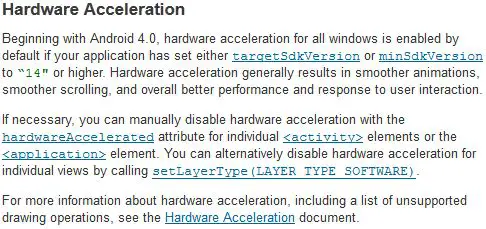While the folks at Google didn’t make a big deal over this in their announcement and in the platform highlights page, they have indeed added hardware acceleration in Android 4.0. Developers don’t have to do much at all to take advantage – simply make your minSdkVersion or targetSdkVersion values to “14” and your application is automatically taking advantage of the GPU inside.
If you’re not familiar, hardware acceleration employs the GPU to render animations and graphics, meaning your Android experience will be as smooth as on, say, Windows Phone 7 or iOS. It’s something we’ve been waiting on for quite some time and we’re rather excited that it’s finally here. Once you see what hardware acceleration does for the user experience you’ll probably never want to leave Android. [source, via]











At last!
My love has come aloooooooong…….
My lonely days are over
And life is like a song
If I specify minSdkVersion of 14, how will that affect users with older Android OS devices?
Well, your app won’t be shown to owners of older devices in Android Market…
Hmm.. that’s unfortunate. I’d rather my app gracefully switch to non-hardware acceleration when necessary.
I’m using following in Gyrobrowser (Flash won’t run in Honeycomb without this hack):
Target API in project settings is 11, but HW Acceleration is the only feature from that set. This at least works for me.
(Disqus XML parser acts up, hopefully the params can be still identified…)
Android market now allows uploading of different APKs for different devices so you could maintain a version with minsdk = 14 and one with minsdk = 8ish so then you will have hardware acceleration when possible. Not ideal but it’s a start.
Goooooood.
This was in Honeycomb. This command, that is. But it doesn’t mean that everything is hardware accelerated.
I don’t think you read the quote. In Honeycomb it wasn’t set on by default. In ICS, it is. If you build an app for ICS, it’s hardware accelerated by default.
There must be a catch to this. Why would it have taken Google this long?
meee loveeee silky smooth…..ice cream sandwhich ;)
Finally! Hope that Android can finally be as smooth as iOS or WP7!
ALL MY DREAMS HAVE FINALLY COME TRUE!!! This will be the iOS killer!!!!
I’ve always told the people that I know that no product will ever be an “Iphone/ios killer” as long as you call it such. with that being said I feel the tables have turned and now ios will become the “android killer”.
iOs is not even worth now if being called an Andrpoid Killer. its mreally faaar off now
why do we have to kill i(nflexible)OS? isnt it awesome just to be undisputed no.1?
Finally google is becoming the captain of their ship!
I want to see the smooth scrolling experience of iOS on it.
Excited! Ahehe
whoohoo! One question though, this article just talks about apps, is the UI itself hardware accelerated? sorry im kinda a newbie in this stuff
This article merely confirms that the api exists but we still dun know if it’s enabled for the main launcher and UI.
In which case this is nothing new since hardware acceleration APIs were present in honeycomb but the OS itself didn’t make use of those capabilities.
people…..the entire OS isn’t hardware accelerated. apps are, but things like scrolling will be SMOOTHER but not hardware accelerated…
there was a discussion about this, and GPU usage was dismissed because of issues it presented in certain cases. i believe they are still relying on garbage collection, but are banking on dual-core being their savior…
the entire OS cannot be hardware accelerated iOS or Windows Phone because it is not a composite based OS (i.e. closed like iOS or Windows Phone) because of Java (Android’s version of it) being an “on the fly” OS. this is why it can be customized (widgets, launchers, etc..) but iOS and Windows Phone are like “taped” or “recorded” OS’s (from my understanding) in that animations are already baked in and are optimized for the hardware they are on (a better, more stable atmosphere).
A composited desktop or screen have absolutely nothing to do with whether your desktop is running on statically compiled binaries, or on bytecode on a JIT compiler.
Garbage collection of your application also has nothing to do with hardware accelerated graphics, GC is a method in which memory allocations are recovered.
This is wildly inaccurate. The terms you are using do not make sense in the way that you are using them.
Everyone should watch this: http://www.youtube.com/watch?v=v9S5EO7CLjo and then clam up until the source is released and us devs get a chance to read through it and see how much is done on each side of the CPU/GPU boundary for 4.0
Please stop the garbage.
LOL! Still a massive fail. Such is the existence of Android, except in sales. The entire OS is a fucking mess.